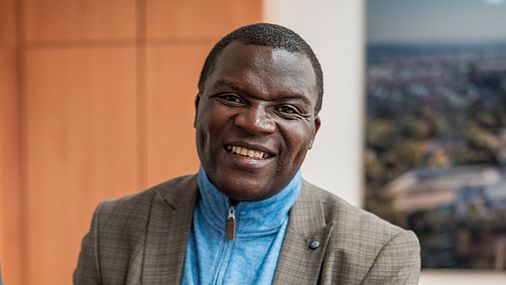“I want to be an advocate for those who cannot advocate for themselves.”
Meet Herbert Ainamani, International Presidential Visiting Scholar Fellow 2023 at the University of Regensburg.
29 November 2023
Dr. Herbert Ainamani is a Senior Lecturer at the Department of Mental Health (School of Medicine) at Kabale University, in Kabale, Uganda. He is the International Presidential Visiting Scholar Fellow 2023 at the University of Regensburg (UR). His research focuses on trauma-related disorders, cognitive functions, psychotherapy, and mental health issues related to caregiving.
The psychologist places a strong emphasis on building capacity for the world’s majority population from low- and middle-income countries, where psychological research is severely underrepresented. During his stay at UR, Herbert Ainamani has been teaching in collaboration with Prof. Dr. Dr. Moritz Köster, Chair of Developmental Cognitive Psychology at UR’s Faculty of Humanities. The two researchers have recently completed the analysis of data from a longitudinal study conducted in rural and urban contexts in South-Western Uganda. The research team is studying the effects of maternal childhood trauma on young children’s emotional and cognitive development in the first three years of life, focusing particularly on inter-generational transmission mechanisms.
UR’s editor spoke with Herbert Ainamani about the challenging work of psychologists and caregivers in one of the world’s lowest income countries, which has given refuge to more people than any other country in Africa: Uganda is home to approximately 1,5 million refugees, most of them from South Sudan, the Democratic Republic of the Congo (DRC), Burundi, and Somalia.

Dr. Herbert Ainamani, International Presidential Visiting Scholar Fellow 2023 at the University of Regensburg. Photo: Julia Dragan/UR
Welcome to the University of Regensburg, Dr. Ainamani! In your recent public lecture, you gave your audience a glimpse into psycho-traumatology of African refugees and emphasized that the need for Western practitioners and researchers to understand it. Why?
Trauma reactions and symptoms are the same all over the world. However, culturally, there is a major difference. In my work, I focus on the refugees in Uganda. In an average refugee community, 300 out of 300 people are traumatized. Not just once, but repeatedly. From childhood maltreatment, from continuous poverty, from displacement, perilous journeys, abduction, or rape.
At the same time, caregivers do not know exactly what their traumatized patients are experiencing. If they have a panic attack, they might be accused of practicing witchcraft, or the person is thought to be experiencing a demonic attack. It might be interpreted as “the person has committed a sin”, or “God is not happy” with him or her. It is not easy for patients or caregivers to understand that trauma-related disorders result from what people have experienced...
That sounds very challenging in terms of treatment.
The first challenge is that we do not have professionals for the treatment. Uganda lacks psychotherapists and we do not have enough trained personnel in psychology and psychiatry. That is why we are on dire need of capacity building. The contact with colleagues and students here in Regensburg provides a real chance in terms of professional exchange. We want to start with online teaching, and it would be wonderful if we could manage to set up a student exchange over time.
The second major challenge is the necessary approach. Whole communities are traumatized. Individual therapeutic treatment is difficult in this case—we basically need community-based interventions.
Who is supporting such approaches?
Mainly the UN Refugee Agency, UNHCR. Other organizations, such as the German GIZ (Gesellschaft für Internationale Zusammenarbeit GmbH) and many others also play an important role. They are active in a wide variety of areas, including economic development and employment promotion, which is of great importance for community-based intervention: Refugees are faced with enormous poverty. They do not have enough food and water. If there is livelihood support, you are starting a holistic treatment. In other words—it is easier for a psychologist to talk to someone whose tummy is full. Particularly when it comes to children.
Fortunately, we can offer a bit more than providing a livelihood to people. UNHCR, for instance, supports group guidance or infrastructure with safe spaces, where refugees can meet and share their experiences. This kind of peer support is very helpful, particularly as it is reducing trauma-related disorders. Research needs to be undertaken on how these small groups, and community involvement in general, are providing help to a lot of people in many of cases.
How does the Ugandan society cope with the impact of trauma?
In terms of the level of knowledge about trauma and trauma-related disorders, Ugandan society is probably at a level of approximately 0.5. Traumatized people are stigmatized. There are sometimes conflicts between refugees and their host communities; however, our government pursues a supportive policy. On arrival, they provide space for refugees to interact with others. We also house people in settlements, not camps. People are given a piece of land, and they can stay as long as they want. Uganda grants refugees the right to work. After some years, they can also apply for citizenship. Uganda has one of the best open refugee policies in the whole world.
What do host societies need to learn?
They should be raising awareness about trauma and the fact that this is a recurring problem. There is also the issue of intergenerational trauma. We do not yet know how this will affect host societies and the generations to come—in many countries. Therefore, it is important that refugees are really taken care of when they arrive somewhere.
What would you recommend?
There is a need for interdisciplinarity and various actors taking care of refugee arrivals. Volunteers or social workers are not enough. We need psychologists, psychiatrists, gynecologists, and pediatricians, as well as housing providers and the NGO community. But most of all, we need to stop the violence. Bringing people to another place is not the solution. Stopping wars and ensuring lasting peace would be the best treatment…
What led you to study psychology?
My family background is very mixed, with several moments that had to be understood with a “psychological eye”. To begin with, my mother died when I was very young, and I cannot clearly recall when she died or how old I was. My other two siblings and I grew up in different homes. We are very detached from each other; more often than not we forgot about each other. In the days of my childhood, parenting was very different; there were a lot of harsh discipline measures and forms of child abuse were more prevalent. I also witnessed a lot of domestic violence and intimate partner violence in my neighborhoods while growing up.
Having family members with mental illness motivated me to dig deeper into this area of psychology in order to understand the etiological causes of mental health disorders as well as the treatment pathways. Thus, I enrolled in psychology classes.
How does your work affect your personal wellbeing?
I am a husband and a father. My children are 15, 10, 8, and 4 years old. When I see unaccompanied refugee minors or other traumatized children or orphans in the general community, my heart weeps. I inevitably think of what could happen to mine as well. Sometimes I wake up during the night and check if all doors are locked. It is hard listening to all those stories of people breaking in someone’s house, killing men, raping women. War scares me. It is sometimes rough being a psychologist. Listening to such traumatizing stories isn’t “like eating a piece of a cake”. It requires self-care. As a professional psychologist, that’s my work, I have to exercise empathy.
Is it possible to emotionally detach yourself at least once in a while?
This is something I am working on. Firstly, by being a scholar – what makes a scholar happy is sharing knowledge with the rest of the world by publishing or presenting researched evidence to scholars and practitioners. Writing about my research findings is something that I have enjoyed since my PhD years. However, I feel the need to create moments of personal space, rest and holidays.
Besides being a scientist and researcher, you founded a non-profit organization called “Hope Partners Africa”. What is your mission?
This is partly what I do as community work. Together with my friends, we started supporting children, particularly orphans and vulnerable children in Uganda. In research, we talk about prevalence and significance, we publish, and then move on. However, beyond the statistical figures, there are faces. They belong to each other. They are connected to each other. That’s why we started a non-profit organization. We send kids to school and look for sponsors. We believe that education works as an equalizer in Africa. It is the children’s fate that drives me. I am here today because someone sent me to school and supported me. Now I want to be an advocate for those who cannot advocate for themselves.
twa.
Information/Contact
Dr. Herbert Ainamani holds a PhD in Clinical Psychology from Mbarara University of Science and Technology (MUST) under the mentorship of Prof Dr Thomas Elbert of the University of Konstanz-Germany. He previously graduated at the Uganda Christian University, having studied Counselling Psychology. Herbert Ainamani holds a diploma in Child and Adolescent Mental Health from MUST and a M. Sc. in Clinical Psychology from the University of Nairobi (UoN) in Kenya. He is a Social Science Research Council Fellow (Next Generation of Social Sciences Research in Africa), was awarded with the African–German young researchers award of the African Mental Health Foundation, and is an IMMANA Post-doctoral research fellow at Friedman School of Nutrition Science and Policy, Tufts University, London School of Hygiene & Tropical Medicine (LSHTM).
Read more about Dr. Herbert Ainamani and Hope Partners Africa
About the International Presidential Visiting Scholar Fellowship Program of the University of Regensburg




